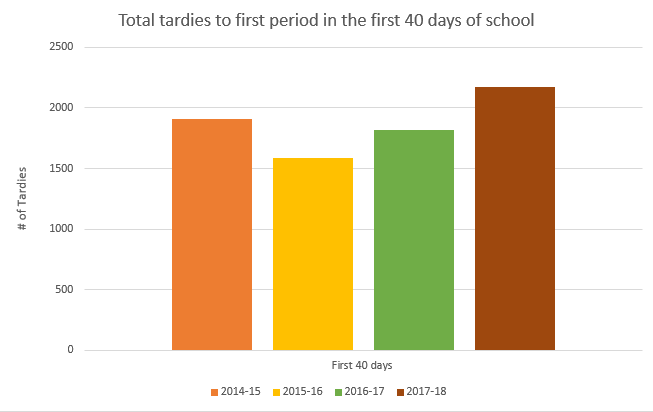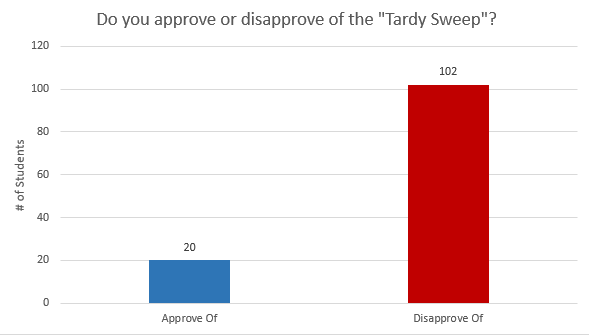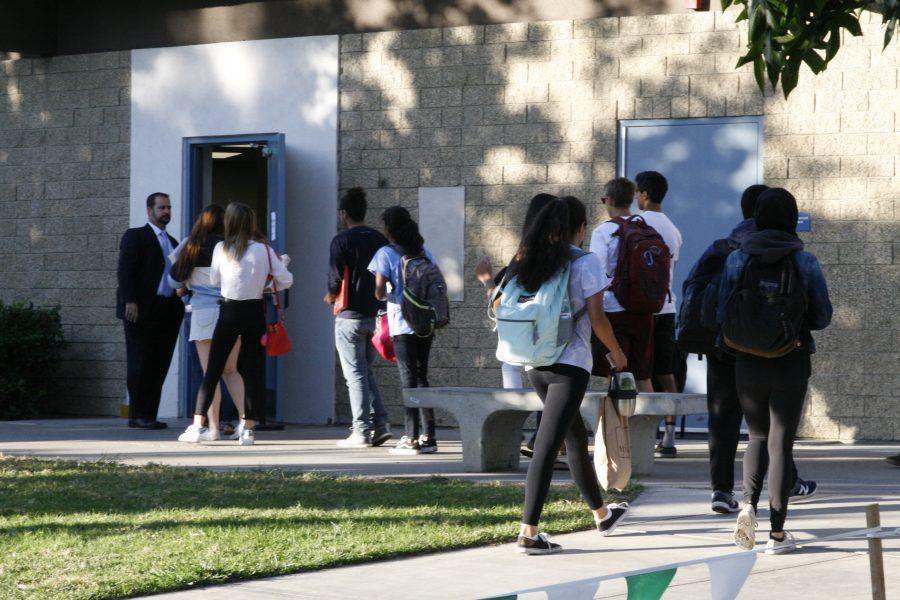Dr. Astor directs tardy students into the MPR during the first twenty minutes of first period. (F. Cervantes)
By SOOJUNG KI
Staff Writer
The first schoolwide “tardy sweep” ended on Friday with an overall decrease in the number of tardies to first period this week compared to last week.
The sweep was announced to students, parents and teachers through emails and newsletters a week and a half prior to the start of this week by the administration.
According to Principal Kevin Astor (Admin.)
,
the “tardy sweep” was not meant to punish students, but rather to encourage them to arrive at school on time and teach them about the importance of punctuality. The administration believes that managing attendance is the “most basic behavior” that helps classrooms function more effectively.“We want people on time [and] we think that it speaks to a level of respect, responsibility and compassion,” Assistant Principal Matthew Pate (Admin.) said. “When you’re late, you’re sending a message to people, and that message is that [what we do] is not important.”
The sweep, the first of its kind for UHS, prohibited students from attending their first period class if they arrived after the second bell, requiring them instead to report to the multi-purpose room (MPR).
Students then checked in with members of the administration, who scanned their ID cards and handed out late passes, before they were allowed to return to their first period class.
For students who were caught in the sweep, the administration used the time during first period to discuss strategies to prevent tardies and advise those who were tardy because of factors outside of their control.
“We know a lot of kids are getting upset because they’re saying ‘I’m thirty seconds late and now you’re making me twenty minutes late to class,’” Assistant Principal Kris Kough (Admin.) said. “Well, this is how important we think it is. The admin team and the faculty think it’s important to give up those minutes in class so we can convey this message to [students].”
The students who were tardy on Wednesday, Thursday and Friday will be expected to attend a mandatory attendance meeting next Wednesday before school, during lunch or after school. The administration gave out warnings Monday and Tuesday to remind students of the importance of coming to school on time.
“We have an agenda, we have something we need to do [and] we have a certain amount of time we need to get it done,” Ms. Valerie Thompson (Science Dept.) said. “And when people just show up at random times whenever they feel like it, it doesn’t work. We need to be efficient with our time use and we need to get people coordinated.”
The implementation of the “tardy sweep” was delayed to mid-October so that students had time to adapt to their schedule. During the planning of the “tardy sweep,” the administration did not only take individual tardies into account, but also the effect of tardiness on classrooms.
“I think [the tardy sweep] is an interesting idea,” Mr. Justin Olvey (Visual and Performing Arts Dept.) said. “I never would’ve thought of something like that and I’ve been racking my brains on ways to motivate kids to get to school on time because tardies have been a huge problem for me during zero and first period.”
“As a teacher who taught for 22 years, it’s very difficult when you have students trickling in and even though they’re coming in quietly, they’re still disturbing,” Kough said.
The administration also wanted to address a rising trend in the number of first period tardies over the past few years, starting in the 2015-2016 school year.

“Have [tardies] really become a problem? Yes they have, and our goal is for kids to be on time,” Pate said. “Some people [blame] traffic, but there’s traffic everyday and you [have] got to work that into your schedule.”
The number of tardies have decreased this week from the previous school week with the exception of Monday and Friday. During the sweep, there were 65 tardies on Monday, 74 on Tuesday, 138 on Wednesday, 44 on Thursday and 41 on Friday. This compares to last week’s tally of 60 tardies on Monday, 93 on Tuesday, 160 on Wednesday, 47 tardies on Thursday and 35 tardies on Friday.
“We did this at my old school and it had a huge positive impact,” Kough said. “We didn’t surprise anyone, it was planned out for a good six months, and we informed parents and kids all summer long. First day of school, kids were running to class; we had never seen that before.”
The overall decrease in tardiness this week compared to last has convinced the administration that the “tardy sweep” has made a positive contribution to students’ punctuality. The administration is considering moving forward with the idea of the sweep, deliberating, among other things, whether or not to warn students in advance as they did for this week.
“I don’t think we’ll see something like [this week’s sweep] again,” Kough said. “I think what you may see is something different. That might be different days [or] different periods [but] we’re still deciding on how to move forward. [Either way], we’re definitely going to have something.”
The delay in returning to class was a major factor that raised opposition from students.
“I understand that they’re trying to motivate students to come on time to school and go to class on time, but it’s counterproductive because if you’re thirty seconds late, you have to wait for ten minutes, which just wastes class time,” Joy Han (Jr.) said.
Some students responded to the “tardy sweep” by ditching their first period class or waiting for their teachers to unlock the door, pretending to have gone to the MPR.
“Some of my friends ditched first period because they were one minute late and didn’t want to wait in the 20 minute line,” Danielle Lee (So.) said. “For students who want to learn in that time, it takes away their right to study.”
In addition, students with no prior tardies who were caught in the sweep claim it is unfair for the administration to treat them the same way as those who are consecutively tardy.
“I think the administration should focus more on targeting students who are consecutively tardy on a daily basis, rather than targeting students who were late one day of the week,” Setareh Emadi (Sr.) said. “I genuinely don’t believe the sweep will help encourage arriving on time and it’s more pragmatic for some students to simply call in sick in order to avoid consequences from the sweep.”
A minority of students believe that the tardy sweep is beneficial for their learning experience. In a poll of 122 random students, only 20 claimed that they agreed with the idea of the sweep.

“I think it’s a good idea to punish the kids who are incessantly tardy, but I’m not a big fan of the tardy sweep,” Kelly Chong (Jr.) said. “The kids who are habitually tardy might only be on time this week because they know that there is a tardy sweep. Who knows what the records will be next week?”
Some teachers have seen an improvement in punctuality within their own classes and believe it is essential to imparting important life skills upon students.
“I think that there is a bigger issue [at UHS] about a lack of respect for teachers and their time, and adhering to schedule,” Thompson said. “Those are life skills kids need to build. I think that they should just make a stronger effort to show up on time.”
A recent post about the tardy sweep published by Sword and Shield on social media has currently been viewed by over 15,000 people. Current students, parents and alumni have expressed strong personal opinions regarding the necessity and efficiency of the “tardy sweep.”
“This isn’t about fascism or making kids lives miserable,” Pate said. “That’s so far from the truth, and for anyone to even make such a statement [means that] they’re lazy and they don’t seek to understand or even attempt to understand anything other than themselves.”
“The important thing is… we’re trying to deliver a message of [what] we think punctuality is, and [the tardy sweep] is another way that we’re just trying to address what we see is a school-wide problem,” Kough said.















Kevin Hua • Nov 8, 2017 at 2:50 pm
I hope the tardy sweep is not going to be kept for next year.
anonymous • Oct 20, 2017 at 9:25 pm
Great article and well researched!!!